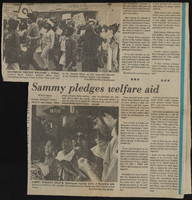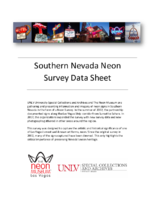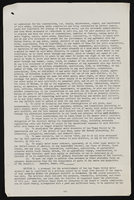Search the Special Collections and Archives Portal
Search Results
Harry Floyd Alter Photograph Collection
Identifier
Abstract
The Harry Floyd Alter Photograph Collection (1905-1916) is comprised of black-and-white photographic prints and negatives. The images depict scenes in Las Vegas, Nevada, including the Las Vegas Ranch, the Arizona Club, and baseball teams and fields. Also included are images of Harry Floyd Alter and his friends.
Archival Collection


The Beat Coffeehouse Neon Survey document, September 17, 2017
Date
Archival Collection
Description
Site address: 520 Fremont St
Sign owner: Michael and Jennifer Cornthwaite
Sign details: This location opened in 2009, but closed in 2016. It will reopen as Eureka!, which is a chain of restaurants based in California.
Sign condition: 5- was a relatively new sign and shined brightly
Sign form: Hanging sign
Sign-specific description: This sign was skeletal neon making the letters "the beat" in a bubble letter font. The word 'the' lights up blue and 'beat' is red neon.
Sign - type of display: Neon
Sign - media: Steel
Sign environment: This location is in the Fremont East District on Fremont and 6th Street in the Emergency Arts Center.
Sign - date of redesign/move: Currently this sign is not visible from public view
Sign - thematic influences: This sign showcases a good use of skeletal neon.
Sign - artistic significance: The property's decor is representative of the bohemian, indie, hipster trend of the mid 2000s into the the 2010s.
Survey - research locations: Review Journal article https://www.reviewjournal.com/entertainment/food/the-beat-coffeehouse-in-downtown-las-vegas-to-close-later-this-year/ , The Beat website http://www.thebeatlv.com/ , Las Vegas Weekly article https://lasvegasweekly.com/intersection/2016/jul/12/losing-the-beat-coffeehouse-detriment-to-downtown/ , Vegas Eater website https://vegas.eater.com/2016/9/26/13051480/the-beat-coffeehouse-closes
Surveyor: Wyatt Currie-Diamond
Survey - date completed: 2017-09-17
Sign keywords: Neon; Hanging
Text

Transcript of interview with Christie Young by Dennis McBride, October 18, 1998
Date
Archival Collection
Description
I've known Christie Young for many years and was grateful she agreed to be interviewed for the Las Vegas Gay Archives Oral History Project. Not only is she frank in what she says, but her background as a researcher in sexual issues and as a straight woman involved in the gay community give her a unique perspective. Ancillary to her donation of this interview transcript to the University of Nevada, Las Vegas, Christie has generously donated her personal journals which detail more than a decade of her life including the years she worked with Las Vegas's gay community . Christie shares the project's concern that documentation of the gay community is ephemeral and vanishes rapidly; her determination that her contribution to that community be preserved greatly enriches our knowledge and will benefit future scholars.
Text

Anita Tijerina Revilla oral history interview: transcript
Date
Archival Collection
Description
Oral history interview with Anita Tijerina Revilla conducted by Marcela Rodriguez-Campo on October 09, 2018 for the Latinx Voices of Southern Nevada Oral History Project. In this interview, Revilla discusses her early life in San Antonio, Texas. She talks about her decision to make education a priority, figuring out the college application process on her own, and her initial interest in social justice. Revilla talks about how her critical consciousness was developed, and her pedagogical approach to teaching. Revilla describes her role in the 2006 May Day march, advocating advocating for the queer community, and disrupting oppressive systems to increase educational access for students. Lastly, Revilla discusses ethnic studies and the history of inequality in the United States.
Text

Biographical essay by Samuel Newman, 2014
Date
Archival Collection
Description
Samuel Newman describes his experience during the Holocaust and being separated from his siblings at different orphanages. He was in Kyrgyzstan from 1943 to 1946, and at an orphanage in Poland until 1951. Newman trained in graphic arts and spent some time in the military in Israel. He came to the United States in 1968.
Text
Audio clip from interview with Glenn Tredwell, March 4, 2016 and April 14, 2016
Date
Archival Collection
Description
In this clip, Glenn Tredwell discusses how he came to Las Vegas, Nevada in 1975.
Sound



